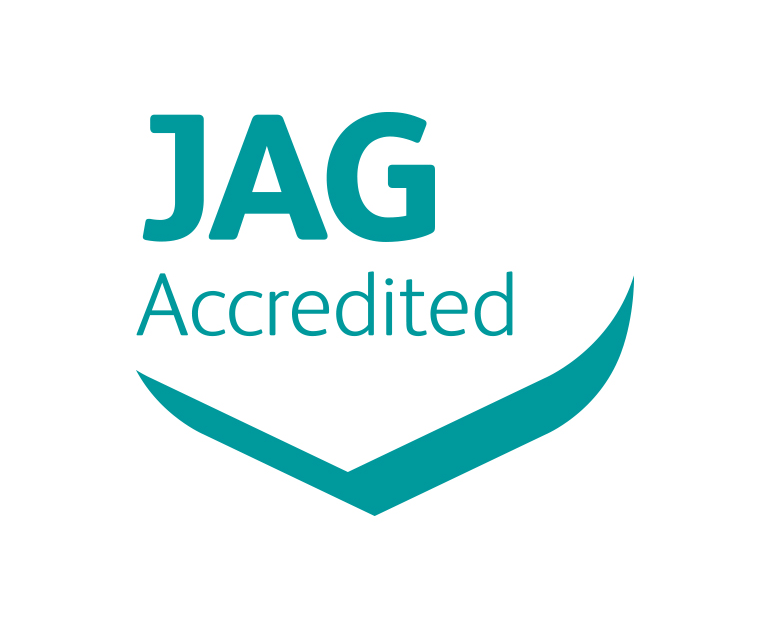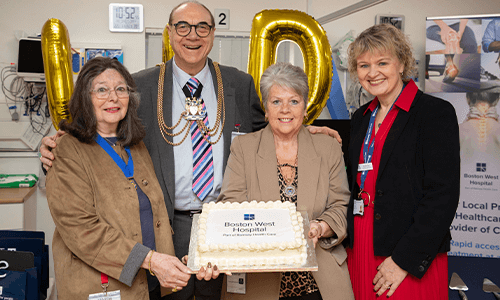Knee arthroscopy is a form of keyhole surgery used to diagnose and treat problems within your knee joint. It’s a minimally invasive procedure that can help relieve pain and improve movement.
In this guide, we’ll explain what knee arthroscopy involves, how long recovery typically takes, and what you can expect from knee arthroscopy surgery with Ramsay Health Care UK.
What is knee arthroscopy?
Knee arthroscopy surgery is a minimally invasive procedure that can help to diagnose and treat problems inside your knee joint.
In the past, knee surgery often required large incisions (cuts) to open up the joint. Today, with knee arthroscopy, surgeons can use much smaller cuts, known as keyhole incisions, around the knee.
Through one of these small incisions, a surgeon inserts a thin, tubular camera, called an arthroscope, into the knee joint. The camera sends images to a screen, allowing the surgeon to see inside the knee and identify the problem.
If treatment is needed, the surgeon can make additional keyhole incisions to insert specialised instruments and carry out the necessary procedure.
Because arthroscopy of the knee joint is less invasive than traditional open surgery, it usually means a shorter hospital stay, quicker recovery, and a lower risk of complications.
Who needs knee arthroscopy surgery?
Knee arthroscopy surgery can be used to diagnose and treat a wide range of problems affecting the knee joint. It’s commonly recommended for patients experiencing persistent knee pain, swelling, stiffness, or locking that hasn’t improved with non-surgical treatments, such as rest, medication, or physiotherapy.
Conditions commonly treated with knee arthroscopy include:
- Persistent or unexplained knee pain that hasn’t responded to other treatments
- Torn meniscus (the cartilage between the bones in your knees)
- Anterior cruciate ligament (ACL) injuries
- Cartilage damage
- Loose fragments of bone or cartilage in the knee joint
- Knee joint infections
- Patella (kneecap) problems, such as a displaced patella
- Synovitis (inflammation of the joint lining)
- Fixing certain types of knee fractures from within
Arthroscopy of the knee joint is often recommended for people with sports-related injuries or active lifestyles, but it can also help those with age-related or degenerative conditions, such as osteoarthritis.
Knee arthroscopy cost
If you decide to pay for your arthroscopy knee surgery yourself, Ramsay offers an all-inclusive Total Care package. This means a single one-off payment at a pre-agreed price that covers all aspects of your treatment, giving you peace of mind and direct access to the care you need, without unexpected costs.
You can also spread the cost of your arthroscopic knee surgery with our flexible finance options.
If you have private medical insurance, your policy may cover knee arthroscopy. We recommend checking directly with your insurance provider and obtaining written confirmation before starting treatment with us.
Find out more about the cost of knee arthroscopy here.
Preparation for knee arthroscopy
Before your knee arthroscopy, you’ll have a thorough consultation with one of our specialist orthopaedic surgeons. They will review your medical history, carry out a physical examination, and may request imaging tests, such as X-rays or an MRI scan, to confirm your diagnosis and plan your procedure.
To help you prepare for knee arthroscopy surgery, you may be advised to:
- Avoid eating or drinking for several hours before the procedure
- Stop taking certain medications, such as blood thinners, as directed by our medical team
- Shower or bathe with unperfumed soap the evening before or on the day of surgery
- Arrange for someone to drive you home after the procedure
- Wear loose, comfortable clothing on the day of the operation
Our healthcare team will provide clear pre-operative instructions tailored to your individual needs, so you feel fully informed and supported throughout your treatment.
Learn more about your stay with Ramsay Health Care.
What happens during a knee arthroscopy?
The exact details of your knee arthroscopy procedure will vary depending on your specific problem, but most knee arthroscopies follow a similar process:
- On the day of surgery, you’ll be taken to the operating theatre and given an anaesthetic. This is usually a general anaesthetic, meaning you’ll be asleep, but in some cases, a local or regional anaesthetic may be used to numb the area.
- Once the anaesthetic has taken effect, the surgeon will make small keyhole incisions around your knee and insert the arthroscope (thin camera). They’ll carefully examine the structures within your knee joint, including the cartilage, ligaments, bone, and synovium (the fluid-filled membranes that cushion your joints).
- If any damage is found, the surgeon can treat it during the same procedure using tiny surgical instruments inserted through additional small incisions. They may remove loose fragments, repair torn cartilage, or smooth rough joint surfaces.
- The procedure usually takes between 30 minutes to an hour, although it can take longer, depending on the complexity of the problem. Once complete, the incisions are closed with sutures or adhesive strips, and a sterile dressing is applied.
At Ramsay Health Care, you’ll receive expert care from experienced orthopaedic surgeons and a dedicated clinical team who prioritise your safety, comfort, and recovery at every stage of your treatment.
What happens after your knee arthroscopy?
After your knee joint arthroscopy has been completed, you’ll be taken to a recovery area where our team will monitor you closely as the effects of the anaesthetic wear off. Pain relief will be provided as needed, and your knee will be bandaged to minimise swelling.
Most patients can go home on the same day, although in some cases an overnight stay may be recommended based on your individual needs.
Before you leave the hospital, the medical team will provide clear instructions on:
- How to care for the surgical site
- Managing any pain or swelling
- Using crutches or walking aids, if needed
- Your rehabilitation plan, including physiotherapy, if required
You’ll also be given details of your follow-up appointments, where your recovery will be assessed and any further support can be arranged.
Knee arthroscopy recovery time
Recovery after knee arthroscopy can vary from person to person. It depends on the type of procedure performed, whether any repairs were made during surgery, your overall health, and how quickly your body heals.
Because knee arthroscopy is a minimally invasive procedure, most patients recover relatively quickly.
Here’s a general timeline of what you can expect during your recovery:
The first few days
You may experience swelling, discomfort, and tiredness. Rest is important during this stage. Elevating your leg and using ice packs can help reduce swelling. Pain can usually be managed with prescribed medication. You may need crutches to move around initially.
1 to 2 weeks
Swelling and pain should begin to ease significantly. Stitches or dressings may be removed during this time. You’ll start to regain mobility, and this is the time post arthroscopy when you may be able to begin simple knee exercises designed to support your healing and improve joint movement.
2 to 6 weeks
Many people return to normal daily activities, including driving, during this phase, depending on how comfortable and mobile they feel. Continued physiotherapy or home exercises will support your progress.
6 to 12 weeks
Most patients can resume more strenuous activities, including sports or gym workouts, with guidance from a physiotherapist.
Full recovery from knee joint arthroscopy typically takes between six weeks and three months. To achieve the best possible outcome, it’s important to follow all your medical advice and follow your rehabilitation plan, including performing your knee exercises post-arthroscopy, as recommended.
What complications can happen after knee arthroscopy surgery?
Knee arthroscopy is generally a safe procedure, but as with any surgery, there are some potential risks and complications to be aware of. These may include:
- Infection at the surgical site
- Blood clots in the leg (deep vein thrombosis)
- Lasting stiffness or reduced range of motion in the knee
- Persistent pain or swelling
- Bleeding inside the joint
- Nerve or blood vessel damage (though this is very rare)
Your surgical team will discuss these risks with you beforehand and take every precaution to minimise them.
What are the benefits of knee arthroscopy surgery?
Knee joint arthroscopy offers several advantages compared to traditional open surgery, including:
- Accurate diagnosis: Knee arthroscopy allows your surgeon to see directly inside the knee joint, making it easier to accurately identify and diagnose the problem.
- Simultaneous treatment: Your surgeon can often treat knee problems at the same time as they identify them, meaning you may not need an additional operation.
- Minimally invasive technique: Knee arthroscopy involves small incisions, rather than larger incisions to fully open the knee.
- Reduced pain and swelling: Smaller incisions generally mean less postoperative discomfort and faster healing.
- Lower risk of complications: Because the surgery is less invasive, there’s a reduced chance of complications such as infections or significant bleeding.
- Faster recovery: Most patients recover more quickly from arthroscopy than from open knee surgery, helping you return to normal activities sooner.
Knee arthroscopy at Ramsay Health Care UK
At Ramsay Health Care, your knee arthroscopy will be performed by a highly experienced consultant orthopaedic surgeon in one of our modern, well-equipped private hospitals, located conveniently across the UK.
We pride ourselves on delivering expert care tailored to your needs. From your initial consultation to recovery, your treatment will be personalised. Appointments will be arranged at times that suit you and your rehabilitation plan will be designed around your lifestyle. Our physiotherapists will support your recovery and get you back to doing what you love as quickly and safely as possible.
With Ramsay, you can expect high-quality clinical care, minimal wait times, and a caring team focused on tour comfort, safety, and long-term outcomes.
Ready to take the next step? Book an appointment for a knee arthroscopy consultation with us today.

